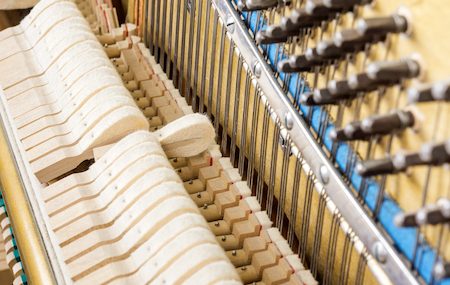If you’ve started looking at buying a new piano, you might have a steep learning curve as you navigate the process.
Many people think buying a piano is similar to any appliance inside your home. Select a brand, set a budget, and buy the first one you find.
But if you’ve done any research, you know that isn’t the right approach to buying a piano. A dishwasher, for example, runs or it doesn’t. Once you select the features, one dishwasher is the same as the others.
Not so with a piano. Each piano is carefully crafted, and is designed to stand alone, no matter what manufacturer’s label is stamped on the instrument. Because they are handcrafted from over 10,000 parts, each will have a unique sound and tonal quality. That’s why you’ll find dealers and manufacturers describing the sound a piano makes in different ways.
Wonder what some of them are?
Bright – when someone says a piano has a bright sound, they usually are referring to a wide blend of tonal qualities. A bright tone can mean the piano creates a pleasant, clear, and brilliant sound. It’s one of enjoyment, with a broad spectrum of the different tones throughout the spectrum. Bright tones usually are emphasized by the notes in the upper ranges with higher frequencies.
Dark – dark refers to the notes in the lower ranges, or bass notes in the full range of the keyboard. Each sound should have a distinct boom. If it becomes more muffled, it might be a symptom of a problem with the felts and hammers.
Mellow – this is often used to describe the full range of harmonics, with each note creating a sound in a rich fashion. This is where depth in each note comes into play. If a piano doesn’t have mellow principles, you might notice it sounds a bit flat or dull when played.
Even or uneven timbre – timbre refers to the character or quality of the sound produced by the instrument. It’s a piano’s voice in both pitch and intensity. It’s the blend that’s created from note to note. If you notice a smooth transition, it’s said to be even. If it’s not, it’s considered to be uneven. A piano technician can adjust this process during tuning.
Rich or complex – richness comes from having a full spectrum of sound, from the lowest bass to the highest treble. When it captures every element, you’ll hear it in the way sound is created. Because of the depth, many people find a rich sound more interesting to listen to.
Piano tones change over time. A new piano must be broken in. An older piano can adapt to new surroundings. That’s part of why it’s important to find a piano technician who is highly skilled at tuning.
Before you buy a piano, take the time to hear the difference. By selecting one that resonates with you, you’ll ensure you love to play it now and into the future.


